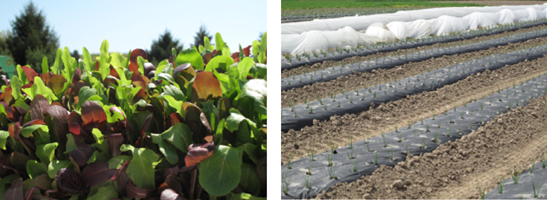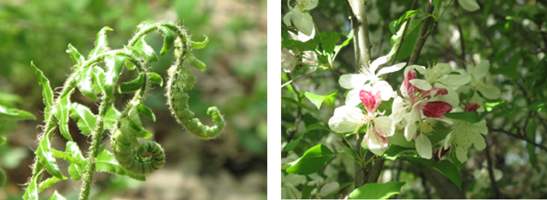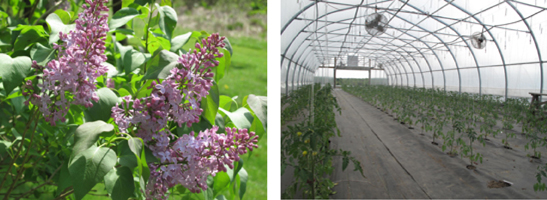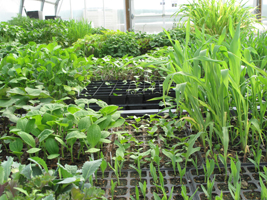A brilliant Saturday and the call to visit Katchkie Farm was irresistible; I invited my friend, Nazli, to come along. We sailed up the Taconic lost in conversation about life in Iran, her native country, where she had recently spent two weeks, returning with tasty treats and packages of vegetable seeds. Is it characteristic of someone who loves a garden to gravitate to local agriculture when travelling? As I travel, I always buy a selection of local seeds.
International trips are most exciting when I locate a source for seeds - the visual depiction of the veggies, the native language lending a touch of exotic allure, and of course, the unresolved question "Is bringing home seeds O.K.?" I often stash the packets in my husband's luggage. My collection includes seeds from Japan, Israel, England and Spain.
Today would be the launch of our international seed garden, which will find its way into the beds of the Sylvia Center children's garden in a few weeks. Farmer Bob filled the planting trays with rich soil as we tore into the seed packets from Israel and Iran, debating the legality of their presence and deciding that commercially packaged seeds are indeed permissible. Nazli had a few varieties of Iranian basil, leeks, savory herbs and cucumbers - and I pulled out seed packets of Israeli tomatoes, beans, watermelon, cantaloupe and scallions. We imagined a joint trip to the Middle East, where we would explore local markets, dine in roadside cafes, forage for wild native plants, and indulge in the flavors, sights and sounds of indigenous agriculture. This musing led to a new idea.

Aside from the universality of gathering around the table to share a meal, there is the simple and powerful act of growing food, a timeless profession in every civilization. What would it be like to bring farmers together from different cultures? What if farmers from Kansas or the Hudson Valley talked to their counterparts in Africa or Afghanistan? Would farmers from Israel converse with farmers in Iraq or Iran? Could they transcend political boarders, as growers would share stories about pests and blights, too much/too little rain, irrigation, indispensible equipment, technological advances and endless days of work.
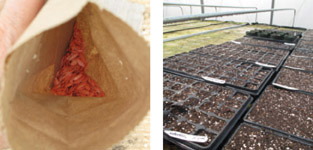
We spent an hour or two seeding in the greenhouse. (Did the thermometer really register 100 degrees?) Envisioning the dishes we could make with the herbs and vegetables that would sprout from our labor was easy. Persian pickles from Iranian cucumbers spiced with Israeli herbs; Israeli Tomatoes stuffed with Iranian seasoning; grains - from either country - with roasted beans, onions and peppers; pesto from the exotic selection of Iranian basil drizzled over the renowned Israeli cherry tomatoes. Our vegetables would fill a giant table of food for peace! Over 20 trays, seeded, labeled, watered and neatly laid out on a nursery table, seeds of understanding and the universal language of hospitality.

Time to walk the fields and see the progress from a week ago. The strawberry plants were in full bloom; row after row of transplants standing tall; the irrigation system pumping pond water; Bob on the tractor turning over earth in the back acres; the chickens adjusting to their new location - a similar scene must be playing out in farm fields around the world.
There is a line-up of farm equipment mid-field. They are various attachments for the tractors - for planting, plowing and harvesting. Within each of these functions, there are subsets requiring specialized machinery. They are fascinating pieces - and clearly designed by a knowledgeable farm professional with a knack for engineering (like our Bob). Though at times, they appear weapon-like, their application is entirely peaceful. But somehow, a metaphor surfaces for farmers and warriors, cultivating the land and conquering the land.

And so the new plot is hatched: Farmers for Peace - an idealistic plan to engage farmers from different countries in conversation.
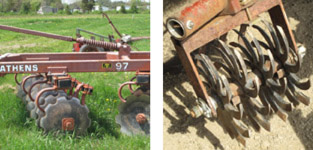
A Google search of farmers for peace yielded some fascinating results. For starters, it is possible to order a bumper sticker with that exact slogan. I instantly ordered five. The connection between farmers and peace organizations is international, beginning with the Peace Corps and decades of work with rural farmers in third-world countries.
There is the story of an Iowan farmer, Roswell Garst, who reached out to Khrushchev in the height of the Cold War: "Years of correspondence formed an unlikely friendship between the American farmer and Soviet Premier Khrushchev. Their common bond was corn. Khrushchev's fascination with U.S. agriculture and an open invitation from a Des Moines Register newspaper editorial inspired the gregarious Soviet leader to personally visit America and its 'tall-corn state' in 1959. Under the watchful eyes and cameras of hundreds of journalists, Garst gave Khrushchev a no-nonsense tour of American farming practices." Liz Garst, his granddaughter commented years later: "It was an agricultural story above all else. How cool that the first interaction between mortal enemies was coming together on how to eat. What a great story." The story, Peace Through Corn, is worth watching - a remarkable film clip from the 1950's.
A northern California based non-profit, Roots of Peace is dedicated to "eradicating landmines and rehabilitating the land". It has been working with Afghan farmers to grow grapes instead of poppies. Agriculture Secretary Tom Vilsack calls agriculture the top non-security priority of our government in Afghanistan. "The grape vine is a symbol of celebration for the 'gift of life'. Whether the juicy nectar of fresh grapes, raisins, or a fine bottle of wine - the bountiful harvest represents the seeds we have in common rather those that separate us. The vine is an ancient metaphor for peace - transcending religions and political boarders. Converting 'Mines to Vines' helps innocent farmers and families avoid a lethal harvest of bloodshed for future generations."
And finally, the powerful story from April '07 of Farms Not Arms, founded by a farmer who lost his son in the Iraqi conflict, who recognized the disproportionate casualty rate amongst rural soldiers compared to cities and suburbs. "To focus attention on the cost rural communities are paying for the war, a new organization, Farms Not Arms, is enlisting farmers in the effort to end it. The founders hope that by encouraging farmers to speak out, they can bridge the divide between the antiwar coasts and the more pro-war interior. Farms Not Arms has two main goals. The first is to increase the visibility of farmers at peace marches. The second goal is to recruit farming families to offer their farms as refuges where returning vets can heal their battle scars through the quiet, steady pace of agricultural work. "All of these guys are coming back trashed," says Will Allen, a Marine veteran from the 1950's who today runs Cedar Circle Farm in Vermont, the state with the highest percentage of battlefield losses. "Farming is healing. We know that, because we've done it."
Citizen Diplomacy! Our dream for 2011 will be to have a small group of local farmers travel to the Middle East and meet their counterparts. It is a dream, but then again, if you have ever spent time on a farm and witnessed the miracles that happen, you know the power of the seed, the root, the plant, the harvest.
But it really isn't a new idea at all. The vision for cultivating peace was perfectly expressed by Isaiah: "...and they shall beat their swords into plowshares, and their spears into pruninghooks: nation shall not lift up sword against nation, neither shall they learn war any more."
Have the farmers plant the seeds of peace - who knows what will grow.
